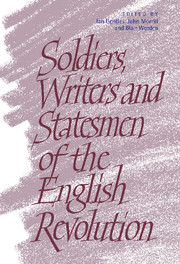Book contents
- Frontmatter
- Contents
- Preface
- Austin Woolrych: an appreciation
- 1 Secret alliance and Protestant agitation in two kingdoms: the early Caroline background to the Irish Rebellion of 1641
- 2 Of armies and architecture: the employments of Robert Scawen
- 3 George Digby, Royalist intrigue and the collapse of the cause
- 4 The iconography of revolution: England 1642–1649
- 5 The casualties of war: treatment of the dead and wounded in the English Civil War
- 6 ‘A bastard kind of militia’, localism, and tactics in the second civil war
- 7 Cromwell's commissioners for preserving the peace of the Commonwealth: a Staffordshire case study
- 8 Colonel Gervase Benson, Captain John Archer, and the corporation of Kendal, c. 1644—c. 1655
- 9 Repacifying the polity: the responses of Hobbes and Harrington to the ‘crisis of the common law’
- 10 Equality in an unequal commonwealth: James Harrington's republicanism and the meaning of equality
- 11 John Milton and Oliver Cromwell
- 12 From pillar to post: Milton and the attack on republican humanism at the Restoration
- 13 ‘They that pursew perfaction on earth …’: the political progress of Robert Overton
- 14 Locke no Leveller
- A bibliography of the writings of Austin Woolrych, 1955-95
- Index
2 - Of armies and architecture: the employments of Robert Scawen
Published online by Cambridge University Press: 10 November 2009
- Frontmatter
- Contents
- Preface
- Austin Woolrych: an appreciation
- 1 Secret alliance and Protestant agitation in two kingdoms: the early Caroline background to the Irish Rebellion of 1641
- 2 Of armies and architecture: the employments of Robert Scawen
- 3 George Digby, Royalist intrigue and the collapse of the cause
- 4 The iconography of revolution: England 1642–1649
- 5 The casualties of war: treatment of the dead and wounded in the English Civil War
- 6 ‘A bastard kind of militia’, localism, and tactics in the second civil war
- 7 Cromwell's commissioners for preserving the peace of the Commonwealth: a Staffordshire case study
- 8 Colonel Gervase Benson, Captain John Archer, and the corporation of Kendal, c. 1644—c. 1655
- 9 Repacifying the polity: the responses of Hobbes and Harrington to the ‘crisis of the common law’
- 10 Equality in an unequal commonwealth: James Harrington's republicanism and the meaning of equality
- 11 John Milton and Oliver Cromwell
- 12 From pillar to post: Milton and the attack on republican humanism at the Restoration
- 13 ‘They that pursew perfaction on earth …’: the political progress of Robert Overton
- 14 Locke no Leveller
- A bibliography of the writings of Austin Woolrych, 1955-95
- Index
Summary
When the New Model Army won the Civil War for Parliament in 1646, a relatively obscure Cornishman was singled out for particular reward. 'Some considerable recompense' was to be bestowed on Robert Scawen, a grateful House of Commons decreed, to ‘remain to posterity as a mark of the favour and acknowledgement of this House to him, for the great pains and the faithful and extraordinary service he hath performed in the affairs of the army’. From the ‘new modelling' of Parliament's forces in the spring of 1645, Scawen served as chairman of the parliamentary body most intimately involved in the war-effort, the ‘Committee of Lords and Commons for the Army' – a post he held continuously for over four years, to within a few weeks of the king's trial in January 1649. His committee was the principal agency through which the English Parliament saw to its army's recruitment, pay and provisioning. No other civilian MP dealt more directly or frequently with the New Model's senior officers than he. And in purely financial terms, all this ‘extraordinary service' at the head of the Army Committee was well rewarded: 2,000 was assigned to him in cash, all of which was actually paid – making him one of the most generously recompensed of all the Long Parliament's MPs.
Not all contemporary notices, however, were quite so laudatory. To his critics — particularly those who had opposed the military reforms of 1645 and who resented Scawen's hand in their success — the chairman of the Army Committee was a man of faction; a back-room figure whose influence could be decisive, at critical moments, in determining the outcome of events.
- Type
- Chapter
- Information
- Publisher: Cambridge University PressPrint publication year: 1998
- 2
- Cited by



